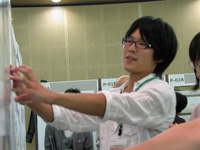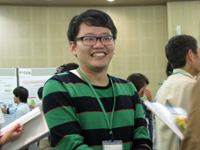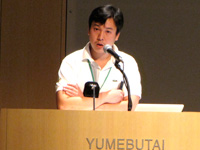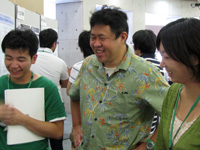GCOE Summer Camp 2011 participant reports

M2 Student, Plant Differentiation and MorphogenesisFirstly, I want to thank all the GCOE staff and professors whose hard work made this year's Summer Camp very successful, and I really appreciated to have this great chance to meet people from different fields and had fruitful discussions with them.
In this Summer Camp, I had my first abstract written in English, my first poster presentation and my first hearing in front of advisors, which was really a very meaningful experience for me.
After my poster presentation, I realized the difficulties to share the research with someone who has a different scientific background, but at the same time, I received many comments and suggestions from them.
D2 students gave their oral presentations in English, and they also chaired the sessions for the first time. They all did very well. I felt embarrassed that although I did have some questions, I couldn't even organize a sentence. Thanks to this experience, I know what my next goal is, and I believe this will help me in the rest of my life.

D1 student, Plant Growth RegulationThis year is my first time to attend the summer camp. For me it is a very wonderful experience. I have gained much new knowledge, but I could also increase my English skills. Before summer camp, all D1 students prepared a poster and a 90 seconds speech in English to introduce their research project. As a non-native speaker, it’s a great challenge for me to conclude all my idea and my experiment results into a short story in English. Ninety seconds speech also gives me a good chance to train my English speaking.
During summer camp, there were many students and researchers from different research background, ranging from plants to animals and microbiology. This is benefit for me to understand other type of research carrying out by other students; thus showing me different idea on my research project. In poster session, I enjoyed discussing with others, and my advisor committee also came to my poster at that time. The discussion between us gave me a chance to think my research in different sights, and I was getting excited to know that many people were interested in my research project. In fact, these discussions were actually very fruitful and brainstorming. I hope the experience this year can help me to achieve oral presentation in summer camp next year. At last but not least, I would like to thank NAIST GCOE program for giving me this wonderful opportunity. I am very grateful to have participated in this summer camp which has really broadens my views.

D2 student, Microbial Molecular GeneticsThe GCOE Summer Camp 2011 will be a nice experience and memory in my life, and for all NAIST doctoral students. In science, work and experiments are not enough: we also have to learn how to share our data, results and ideas with people in an understandable way. But this skill is difficult, due to differences in our ability and experience. We need an environment such as the GCOE Summer Camp where we feel comfortable to share our research. During the three days of the GCOE Summer Camp 2011, we really lived in a scientific environment where we could speak, listen and discuss all aspects of biological science with an attentive audience. This environment also helps us to show our passion for science. I think everyone was strongly impressed with the smile and the enthusiasm of Ohta san, a D2 student who injured his knee one month before the meeting. He was the best speaker at this Summer Camp, in my mind, and his attitude challenges anyone who still thinks the GCOE Summer Camp is a strict test with a strict audience. Professor Ko Shimamoto said, "We need to generate a strong atmosphere to promote interesting science," and Ohta san did this in a fantastic way.
The limited amount of free time during the meeting was the only disadvantage, but it was definitely solved in the poster session and mixer. In these periods, we could deeply and warmly discuss our research without worrying about the limited time. These were good opportunities to understand the interesting projects and establish English communication among students, guests and faculty members. Specially and interestingly, 67 comments by faculty members, guests and postdocs were sent to each D2 student after the Summer Camp. This is a great and very useful idea because it helps us to improve not only our research but also our presentation skills in future.
Finally, I know that this was the fifth and the last Summer Camp of the GCOE program. During this time, it has gradually and completely changed the students' thinking and their attitudes to science. Now, at NAIST, we really enjoy discussing our research in English. I deeply want to thank the GCOE program and organizers, and I strongly hope and believe that this last Summer Camp of the GCOE program will be continued in another way; the NAIST students will have this chance next year and in the future.

Assoc. Professor, Molecular and Cell GeneticsFirst of all, I appreciate all the participants of the Global COE Summer Camp. Fortunately, I feel this year's Summer Camp was especially helpful for Japanese participants to cultivate spirits and skills to live in a globalized world. Of course, the main issue is to speak English. Probably because of sufficient preparation and with the excellent support by Ian-sensei, all the oral presentations were fluent and understandable. Hopefully, discussions will be smoother and more fruitful in future years. So I suggest to Japanese students that they talk about science in English, even in the daily lab life, since we have many foreign colleagues at NAIST. Also, non-scientific communications with foreign colleagues should be an important and delightful issue. At this Summer Camp, I was really happy when drinking with foreign students. However, in the context of true globalization, it should be also important to notice and understand cultural differences. The abstinence of our Muslim colleagues, during Ramadan, is a good example. Finally, I indeed hope that in future, many more colleagues can also enjoy this valuable and wonderful event.
